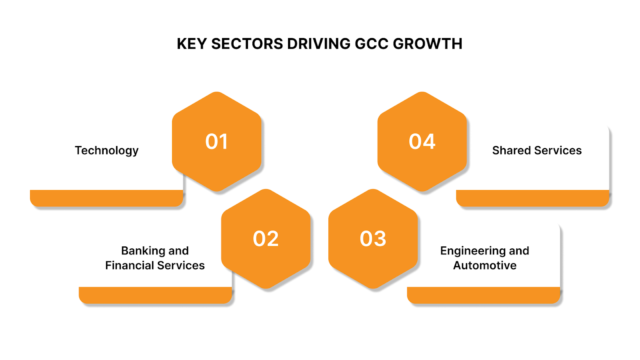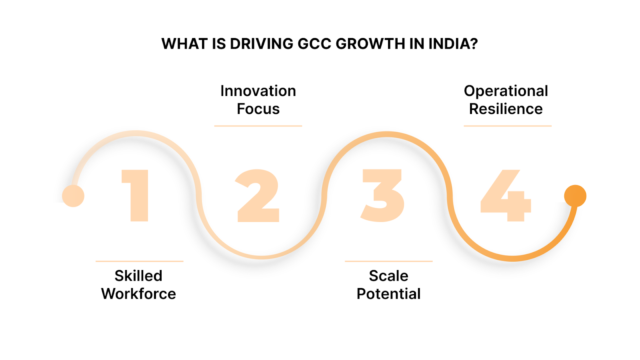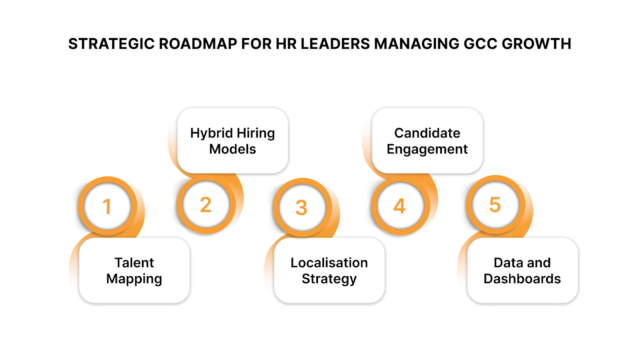Global Capability Centres (GCCs) are expanding rapidly in India. They are no longer seen as back-office operations but as critical drivers of innovation and growth.
This pace of GCC growth brings exciting opportunities for multinational companies setting up or scaling their presence in India’s leading business hubs.
At the same time, it creates complex hiring challenges. Building and retaining skilled teams is now the decisive factor for success, and that’s where the right recruitment partner becomes essential.
In a nutshell:
- GCCs in India have evolved from support functions into centres of innovation and strategy.
- India’s six major hubs remain the core destinations for capability centre expansion.
- Rapid growth is reshaping hiring priorities, making recruitment a strategic function for HR leaders.
- Partnering with experienced staffing firms helps GCCs secure specialised talent and sustain long-term success.
What is a GCC?
A Global Capability Centre (GCC) is a dedicated unit set up by multinational companies to manage critical business functions from a single location. These centres go beyond cost advantages, acting as strategic hubs for operations, technology, and innovation.
Over the years, GCCs in India have evolved from back-office support roles to becoming centres of excellence.
They are now seen as drivers of transformation, helping organisations accelerate digital adoption, improve customer experience, and build long-term competitive strength.
India’s GCC Expansion: Key Sectors and Hubs
India has become the preferred destination for Global Capability Centres (GCCs). What began as cost-focused back-office units has now transformed into innovation-led hubs that deliver strategic value. For multinational organisations, GCCs in India are central to building global excellence.
Key Sectors Driving GCC Growth

The expansion of Global Capability Centres in India is closely linked to industries that depend on skilled talent and innovation. The most significant sectors include:
- Technology: Centres delivering software development, product engineering, data analytics, and cybersecurity.
- Banking and Financial Services (BFSI): GCCs focused on compliance, analytics, and digital financial platforms.
- Engineering and Automotive: Units handling design, R&D, and advanced manufacturing support.
- Shared Services: Centralised teams managing HR, finance, procurement, and customer operations.
These sectors highlight the breadth of GCC growth in India and underline why the demand for specialised professionals continues to rise.
India’s Six Prime GCC Hubs
GCC expansion in India is concentrated in six major cities that combine strong talent pools with advanced infrastructure:
- Hyderabad: A fast-growing hub for technology, product development, and innovation-led GCCs.
- Bengaluru: The established centre for IT, engineering, and research-driven operations.
- Chennai: A preferred location for automotive, engineering, and financial services capability centres.
- Pune: Strong in technology, engineering, and manufacturing-linked services.
- Delhi NCR: A diverse hub for financial services, consulting, and shared service operations.
- Mumbai: India’s financial capital, hosting GCCs in BFSI, consulting, and professional services.
These hubs remain the first choice for multinational firms building or scaling their GCC operations in India.
Also Read: Top Modern Recruitment Techniques for 2025
What Is Driving GCC Growth in India?

A mix of talent strength, innovation capability, and business resilience is fueling the expansion of GCCs in India. Together, these factors explain why multinational companies continue to place their long-term bets on India.
- Skilled Workforce: India offers a unique advantage with millions of professionals already working in GCCs and a steady flow of STEM graduates each year. This ensures a consistent supply of talent across IT, BFSI, engineering, and shared services.
- Innovation Focus: Nearly 86% of GCCs in India are now engaged in AI and machine learning projects. This marks a decisive shift from back-office support to centres driving global digital transformation and R&D.
- Scale Potential: By 2030, the number of GCCs in India is projected to reach 2,400–3,000, making it one of the fastest-growing ecosystems worldwide. This growth is supported by India’s ability to provide both depth and diversity of talent across industries.
- Operational Resilience: GCCs in India have proven their ability to safeguard critical operations during global disruptions. This reliability has reinforced India’s position as a trusted hub for capability centres handling sensitive and strategic functions.
These drivers position India not just as a cost-effective base, but as a global leader in capability centre growth, where talent, technology, and innovation converge.
Also Read: Recent Recruitment Trends for 2025
What GCC Growth Means for Talent Leaders
The rise of GCCs in India has created new demands for HR and talent leaders. The most important implications are:
- Specialised Skills: Growing need for professionals in AI, data analytics, cloud, cybersecurity, and engineering.
- Scale and Speed: Requirement to hire large volumes within tight timelines while maintaining quality.
- Attrition Risks: Higher drop-offs and employee churn due to multiple offers and salary pressures.
- Candidate Experience: Stronger focus is needed on engagement and onboarding to secure talent.
For leaders managing GCC operations, these factors mean recruitment must shift from a transactional process to a strategic enabler of business success.
This is where a partner like V3 Staffing adds real value, with services tailored to support GCC growth across India.
Strategic Roadmap for HR Leaders Managing GCC Growth

To keep pace with GCC growth, HR and talent leaders need a clear roadmap that balances speed with sustainability. The following priorities can help guide recruitment strategy:
- Talent Mapping: Build visibility into skill availability, salary benchmarks, and regional talent pools before expansion.
- Hybrid Hiring Models: Combine permanent, contract, and RPO models to adapt to varying business needs.
- Localisation Strategy: Use hub-and-spoke hiring with Tier-1 centres supported by Tier-2 cities for cost and talent access.
- Candidate Engagement: Strengthen communication, onboarding, and retention programmes to reduce attrition.
- Data and Dashboards: Use recruitment analytics, reporting, and SLA-driven tracking to bring transparency and control.
With these priorities in place, leaders can convert GCC growth opportunities into long-term workforce success.
How V3 Staffing Supports GCC Growth in India
V3 Staffing provides workforce solutions designed to address the challenges faced by fast-scaling GCCs. Each service aligns with the key hiring needs of global capability centres in India’s major hubs.
- Permanent Recruitment: Tailored sourcing for mid-to-senior roles, ensuring long-term stability in core functions.
- IT Staffing: Access to a curated pool of niche technology talent, including cloud engineers, data specialists, and software architects.
- Temporary & Contract Staffing: Flexible models for project-based requirements and rapid team deployment.
- Recruitment Process Outsourcing (RPO): Embedded hiring support with SLA-driven delivery, freeing up internal HR capacity.
- Executive Search: Targeted hiring for leadership roles, helping GCCs secure the right CXOs, VPs, and Directors.
By combining domain expertise with presence across prime hubs, V3 Staffing ensures GCCs can scale with speed, precision, and confidence.
Conclusion
The rise of GCCs in India is reshaping how multinational firms think about growth, innovation, and talent. For leaders, the ability to align recruitment strategy with business objectives is what separates sustainable expansion from short-term scaling.
Partnering with the right recruitment specialists helps HR leaders stay focused on strategy while ensuring hiring challenges are managed with precision.
If your organisation is planning to expand or optimise its GCC presence in India, V3 Staffing can help you achieve hiring outcomes with speed and confidence.
Contact us today to explore tailored workforce solutions for your GCC growth journey.
Frequently Asked Questions
Q. How do I align my hiring strategy with GCC growth in India?
A. Start by defining the skills most relevant to your GCC function and match them with talent pools in India’s key hubs. A specialised recruitment partner can bridge gaps quickly.
Q. Where should I build my GCC team in India?
A. Focus on established hubs such as Hyderabad, Bengaluru, Chennai, Pune, Delhi NCR, and Mumbai for proven depth of talent. Tier-2 cities are worth considering for emerging skills and cost advantages.
Q. How can I reduce attrition in my GCC workforce?
A. Strengthen engagement during hiring, improve onboarding, and offer clear career progression. Working with recruiters who pre-assess cultural fit can also lower churn.
Q. What hiring model should I use when scaling my GCC?
A. Adopt a mix of permanent recruitment, contract staffing, and RPO. This hybrid model balances stability for core functions with flexibility for rapid scaling.
Q. Why do I need a recruitment partner for my GCC growth journey?
A. Specialist partners bring speed, sector knowledge, and pan-India reach. This allows your internal team to focus on strategy while recruitment delivery is handled with precision.




